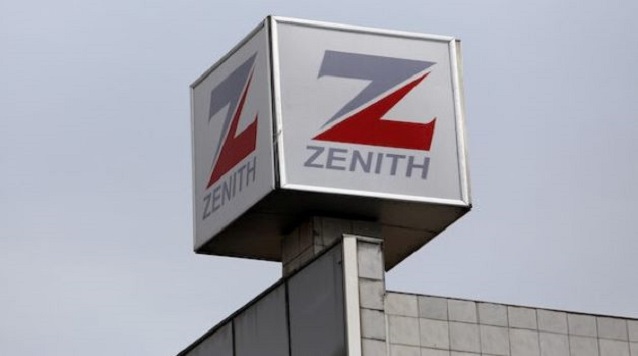E-Financial
UBA, Saudi EXIM Bank Partner to Enhance Business Relations and Export Growth

United Bank for Africa (UBA) Plc, Africa’s Global Bank, and Saudi Export-Import Bank (Saudi EXIM), a premier export credit agency in the Kingdom of Saudi Arabia, have announced a partnership aimed at strengthening business growth and enhancing economic cooperation between their economies.

l-r: CEO, UBA UAE, Vikrant Bhansali; Group Treasurer, United Bank for Africa (UBA), Adeleke Adeyemi; Group Managing Director/CEO, United Bank for Africa(UBA), Oliver Alawuba; and CEO, Saudi Export-Import Bank (SAUDI EXIM), Engr. Saad Akhaib, during the signing of Memorandum of Understanding between UBA and Saudi EXIM, towards deepening of economic and finance relationsand export growth Between Saudi Arabia and Africa, at the Saudi Arab African Economic Conference, in Riyadh, Saudi Arabia, on Thursday
To this end, both institutions signed a Memorandum of Understanding (MoU) on November 9, 2023, to foster economic cooperation and trade relations between the two entities.
The MoU was signed on the side-lines of the Saudi and Arab African Summits in Saudi Arabia.
The partnership between UBA Group and Saudi EXIM Bank outlines the guiding principles for developing cooperation and relations between the two banks, with primary focus on promoting trade through the export of goods and services between the Kingdom of Saudi Arabia and the African markets.
Apart from collaborating in these areas, both institutions will also ensure sustained participation in the development of the African economy through intercontinental business relationships that will be facilitated by the new partnership.
The MoU will also work towards supporting joint projects and collaboration involving the export of goods and services from Saudi Arabia, and exploring opportunities to co-finance, co-insure, co-guarantee, and reinsurance projects jointly undertaken by companies from both regions.
It will also facilitate the exchange of information and know-how in the field of export credit policies and practices, the sharing of experiences and best practices through meetings, conferences, seminars, and workshops, as well as providing training for each other’s staff members and staff exchanges when beneficial to both parties.
The framework for cooperation on specific joint projects will be established under separate agreements, with each party determining the terms and conditions of its support in line with its policies, procedures, and national legislation.
Also, the exchange of information will be facilitated by both institutions, while technical know-how in the field of export credit policies and practices will also be shared.
Oliver Alawuba, chief executive officer, UBA, who expressed his enthusiasm about this collaboration, explained that through the partnership, both companies will Identify and support joint projects and collaboration in the area of exportation of goods and services.
He said, “We are happy to join hands with Saudi EXIM Bank in a partnership that holds great promise for businesses and economies in both regions. This agreement will not only facilitate the export of goods and services but also solidify our commitment to intercontinental business relationships and contribute to the development of the African economy.”
“This relationship is particularly promising, considering that Saudi Arabia is deliberate in deepening economic cooperation with Africa and UBA with presence in 20 African countries, providing the necessary vehicle for deepening this engagement. The partnership also expands our access to Asia and the Middle East, where the Bank recently opened a subsidiary in Dubai,” Alawuba said.
His Excellency Eng. Saad Al-Khalb, CEO of Saudi EXIM, said, “By uniting our strengths, we are setting in motion a dynamic platform that will propel the export of innovative Saudi goods and services, catalyze industrial growth, and magnify our global footprint across the rich tapestry of African economies. This, we believe, will not only augment Saudi Arabia’s export diversification but also contribute significantly to the socio-economic fabric of the African nations we will serve together.”
UBA is a leading Pan-African financial institution, offering banking services to more than thirty-seven million customers across 1,000 business offices and customer touch points in 20 African countries.
With presence in New York, London and Paris and now the UAE, UBA is connecting people and businesses across Africa through retail, commercial and corporate banking, innovative cross-border payments and remittances, trade finance and ancillary banking services.
Saudi EXIM was established in 2020 with the aim of promoting Saudi non-oil exports and enhancing its competitiveness across various sectors in global markets. This is done by providing financing services, guarantees and credit insurance with competitive advantages to enhance confidence in Saudi products and increase the contribution of non-oil industries to 50% by 2030 from the current percentage of 16%, which is a major goal of the Kingdom’s Vision 2030. The Export-Import Bank is one of the development funds that are supervised by Saudi National Development Fund
E-Financial
Zenith Bank Gets Regulatory Approval for Full Takeover of Paramount Bank

Zenith Bank, Nigeria’s second biggest lender by market value, has received approval from the Competition Authority of Kenya (CAK) to acquire 100 percent of Paramount Bank Limited, clearing a key regulatory hurdle in its East African expansion drive.

In a statement on Thursday, CAK said the transaction is “unlikely to lead to a substantial prevention or lessening of competition in the market for the provision of banking services in Kenya” and would strengthen Paramount’s financial position, helping it meet enhanced core capital requirements over the long term.
The Kenyan regulator noted that the deal poses no risk of reduced competition in the country’s banking sector. Zenith currently has no banking operations in Kenya, while Paramount is a Tier III lender with a modest 0.2 percent market share.
“The approval is based on the Authority’s determination that the transaction is unlikely to harm competition, while any negative public interest concerns regarding employment can be addressed through mitigating remedies,” CAK added.
Paramount met the Central Bank of Kenya’s KSh3.0 billion core capital requirement in November last year, reporting KSh3.118 billion after raising KSh332 million from shareholders, according to Mwango Capital, a Nairobi-based research firm.
The deal reflects a broader shift among banks in East Africa’s largest economy as lenders seek growth opportunities beyond increasingly saturated home markets marked by weak credit expansion, rising regulatory costs, and intense competition.
While several global banks — including Standard Chartered and HSBC — have scaled back African operations over the past decade, Zenith’s move signals confidence in selective regional expansion, particularly in East Africa, where economic growth and financial inclusion trends remain supportive.
The banking group is also widening its continental footprint. Last month, the lender disclosed plans to expand into Ethiopia, Africa’s second most populous country, as it targets generating up to half of its profits outside Nigeria over the medium term.
Historically, Nigeria, the continent most populous nation contributed as much as 90 percent of the bank’s earnings, a dominance that is now gradually easing.
Data cited by The Africa Report show that profit contributions from foreign subsidiaries rose to 27 percent in the first nine months of 2025, up from 14 percent in 2024.
Nigeria’s banking recapitalisation drive is also pushing large lenders such as Zenith to deploy capital beyond their home market. In January 2025, Zenith — which holds an international banking licence — raised N350.4 billion ($242 million), lifting its paid-up capital to N614.6 billion ($425 million).
With higher capital buffers in place, banks are reassessing how best to deploy fresh funds as domestic earnings normalise following two years of windfall gains.
As part of the approval, Zenith has been required to retain Paramount’s 78 employees for at least 12 months after the transaction is completed.
The bank is listed on the Nigerian and London stock exchanges and operates across corporate, commercial, retail, and investment banking. Its international subsidiaries span the United Kingdom, Ghana, Sierra Leone, Gambia, the UAE, and China.
E-Financial
Court Jails Ogiemwonyi, Stockbroker for Theft of $80,000, N953m Shares Proceeds

Victor Ogiemwonyi, a Lagos stockbroker, and Partnership Securities Limited, his company, have been convicted for allegedly stealing shares worth N953 million and $80,000 belonging to one Mr. Arnold Onyekwere Ekpe, a former managing director of Ecobank Transnational Incorporated (ETI).

Ogiemwonyi was convicted after he was found guilty of two-count charges bordering on stealing, contrary to Section 285(1), (9) (b) and (c) of the Criminal Law of Lagos State, 2011 slammed on him by the Economic and Financial Crimes Commission (EFCC).
Ekpe, through Messrs Margaret Onyema, his counsel, has sometimes in October 2016 in a petition to the EFCC alleged that he instructed the defendants to sell his 96,077,872 units of Ecobank Transnational Incorporated (ETI) shares, which were sold at the rate of N1,296,885,311.02.
But he said out of the proceeds of the sale, the stock broker paid only N300,000,000.00 to him while he dishonestly diverted the balance for personal use.
Following investigations, the defendants were charged with two counts of stealing.
Count one reads:
”Victor Ogiemwonyi and Partnership Securities Limited between the months of June, 2016 and September, 2016 at Lagos within the jurisdiction of this honourable court dishonestly stole the sum of N953, 535,861.57 (Nine Hundred and Fifty Three Million, Five Hundred and Thirty Five Thousand, Eight Hundred and Sixty one Naira Fifty Seven Kobo) being part of the proceeds of sale of 96, 077, 872 Ecobank Transnational Incorporated Shares, property of Mr. Arnold Onyekwere Ekpe”.
Count Two reads:
“Victor Qgiemwonyi and Partnership Securities Limited sometime between June, 2016 and July, 2016 at Lagos within the jurisdiction of this honourable court dishonestly stole the sum of USD$80,000.00 (Eighty Thousand United States of America Dollars) which formed part of the accrued dividends on 96, 077,872 Ecobank Transnational incorporated Shares, property of Mr. Anold Onyekwere Ekpe”.
At trial, the prosecution, led by Ola Sesan, called five witnesses and tendered 67 exhibits, all of which were admitted and marked by the court.
The defence, on its part, called three witnesses, including the first defendant.
Delivering judgment on Wednesday, Justice Modupe Nicole-Clay of the Lagos State High Court sitting in Ikeja, Lagos convicted Ogiemwonyi and his company, Partnership Securities Limited, guilty on all counts.
The court sentenced the first convict to pay a fine of N10 million, while the second convict was ordered to pay a fine of N20 million.
Also, the court directed the convicts to pay back the entire money stolen from the petitioner, both in naira and dollars.
Recall that Securities and Exchange Commission, SEC, had in 2017 banned Victor Ogiemwonyi, from operating in the capital market for life over alleged unprofessional conduct in the Nigerian capital market.
He was also banned for life from holding directorship position in any public company in Nigeria.
He was also ordered to pay a penalty of N100,000.
SEC said Ogiemwonyi was banned after he was found guilty of breaching Rule 1(iii) of the Code of Conduct for Capital Market Operators and Their Employees as contained in its Rules and Regulations made pursuant to the Investments and Securities Act 2007.
The ban also followed petition by EFCC to SEC accusing Ogiewonyi of misappropriation of about N1.24 billion, $80,000.00, stealing and dishonest conversion of proceeds of share sale belonging to an investor.
It was alleged that he used his company to dupe over 300 investors over N4.8 billion with Arnold Ekpe a former Managing Director of Ecobank Transnational Incorporated, ETI, being one of his victims.
E-Financial
FCCPC Delists Non-Compliant Digital Lenders Post-January 5 Deadline

Federal Competition and Consumer Protection Commission (FCCPC) has commenced enforcement actions against Digital Money Lending (DML) operators that failed to regularise their operations under the Digital, Electronic, Online and Non-Traditional Consumer Lending Regulations, 2025 (DEON Regulations).

FCCPC
The commission withdrew the conditionally approved status of non-compliant DML firms and removed them from its official register of approved digital lenders, effective immediately after the January 5 compliance deadline.
FCCPC Executive Vice Chairman and Chief Executive Officer, Mr Tunji Bello, announced the measures on Wednesday, emphasising their role in upholding regulatory standards and ensuring certainty in Nigeria’s digital lending sector.
Mr Bello stated that the compliance window provided under the DEON Regulations, which took effect on July 21, 2025, had closed, paving the way for fair, orderly and due process-driven enforcement.
He noted that the actions target persistent issues such as exploitative loan recovery tactics, data privacy breaches, harassment of borrowers and anti-competitive practices that have plagued the sector.
The DEON Regulations, issued on September 3, 2025, under the Federal Competition and Consumer Protection Act 2018, mandate all non-bank digital lenders to register, adhere to fair interest rates, ethical debt recovery and robust data protection measures.
Non-compliance now attracts severe penalties, including fines up to N100 million or one per cent of annual turnover, operational restrictions, app store delistings and potential director disqualifications for up to five years.
As of late 2025, the FCCPC had granted full approval to 438 digital lending companies, with recent data indicating over 521 firms now under regulatory scrutiny post-deadline.
The commission’s phased crackdown involves collaboration with the Central Bank of Nigeria, Google and Apple for account freezes and global app removals targeting unregistered platforms.
Industry watchers described the enforcement as a landmark move to sanitise Nigeria’s fast-expanding digital credit market, which has seen rising borrower complaints despite earlier 2022 interim guidelines.
The FCCPC reiterated its commitment to balancing innovation with consumer protection, urging affected operators to swiftly meet requirements for reinstatement.

 E-Business2 days ago
E-Business2 days agoFirm Detected a Scam Exploiting OpenAI’s Teamwork Features

 Broadcasting2 days ago
Broadcasting2 days agoDG NCC Tasks University Dons on Research Commercialization, IP Management to Build Global Competitive Ecosystems

 E-Financial2 days ago
E-Financial2 days agoMoMo PSB Expands Cross-Border Transfers Across Africa

 E-Financial2 days ago
E-Financial2 days agoBanks to Cut Fraud Response Times to Under 30 Minutes

 Telecom2 days ago
Telecom2 days agoFG Expands 3MTT Programme Across the Country

 News2 days ago
News2 days agoFirms Face Gaps Between AI Ambition and Execution

 Telecom2 days ago
Telecom2 days agoMTN Foundation Trains 2,000+ Young Nigerians in ICT for SME Growth

 General News2 days ago
General News2 days agoKuda Unlocks Instant Online Accounts for NGOs and Religious Bodies























